【免费下载】初中英语一般将来时专项语法讲解
初中英语语法一般将来完成时专项讲解及练习

初中英语语法一般将来完成时专项讲解及练习一、一般将来完成时概述一般将来完成时是指在将来某个时间点之前完成的动作或事件。
它由助动词“will have”加上动词的过去分词构成。
在英语中,一般将来完成时通常用来表示预测、推测或计划。
二、一般将来完成时的用法1. 表示将来某个时间点之前的动作或事件。
例如:- By 8 o'clock tomorrow, I will have finished my homework.- By the end of this month, they will have graduated from university.2. 表示将来某个时间点之前已经完成的动作或事件。
例如:- By the time she arrives, I will have already left.- By next Friday, I will have visited all the famous tourist attractions.3. 表示推测或预测将来已经发生的动作或事件。
例如:- I think they will have arrived at the airport by now.- By the time we get there, they will have already eaten dinner.三、一般将来完成时的练1. 根据句子意思,用一般将来完成时填空。
- By the end of this year, I ___________ (finish) my project.- She ___________ (leave) for Paris by the time you arrive.2. 改写下列句子,使用一般将来完成时。
- They will reach their destination before sunset. →_____________________________________四、总结一般将来完成时是英语中表示将来某个时间点之前已经完成的动作或事件的一种时态。
(完整版)初中一般将来时讲解

(完整版)初中一般将来时讲解初中一般将来时是英语中表达将来时间的一种时态,它用来表示将来某个时间将要发生的动作、事件或情况。
本文将对初中一般将来时进行详细讲解。
一、构成初中一般将来时的构成主要由以下几个部分组成:1. 助动词“will”,用于表示将来。
2. 动词的原形(即不带to的动词原型)。
二、用法初中一般将来时主要有以下几种用法:1. 表示将来的计划或意图。
例如:- I will study harder in order to pass the exam. - They will go on a trip next week.2. 表示预测或推测。
例如:- It will rain tomorrow.- The team will win the game.3. 表示承诺或意愿。
例如:- I will help you with your homework.- We will support you all the way.4. 表示意愿或请求。
例如:- Will you please open the window?- I will go shopping if you want.三、注意事项在初中一般将来时的使用中,需要注意以下几点:1. 助动词“will”后面直接接动词的原形,不带任何变化。
2. 否定句在助动词“will”后面加上“not”构成,缩写形式为“won't”。
3. 疑问句将助动词“will”提到句子的主语之前。
四、例句以下是一些初中一般将来时的例句:1. I will travel to Japan next year.3. Will you go to the beach tomorrow?五、总结初中一般将来时是英语中一种表示将来时间的时态。
在使用时,需要注意助动词“will”的使用以及动词的原形。
它可以用于表示计划、预测、承诺等。
希望本文能够对您的学习有所帮助。
初中英语一般将来时详细讲解
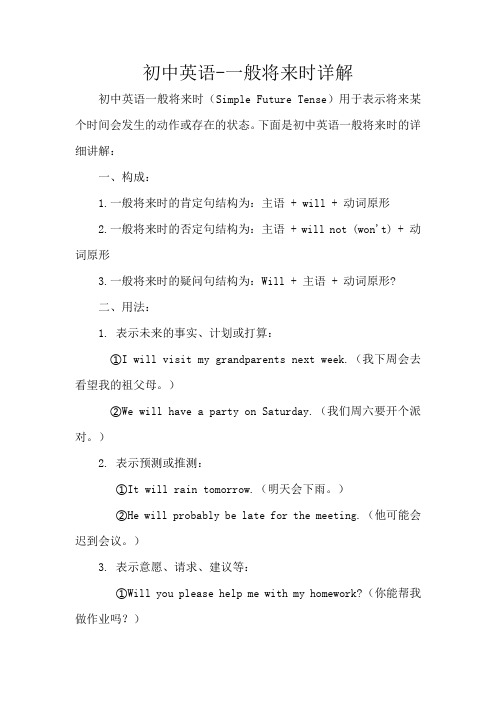
初中英语-一般将来时详解初中英语一般将来时(Simple Future Tense)用于表示将来某个时间会发生的动作或存在的状态。
下面是初中英语一般将来时的详细讲解:一、构成:1.一般将来时的肯定句结构为:主语 + will + 动词原形2.一般将来时的否定句结构为:主语 + will not (won't) + 动词原形3.一般将来时的疑问句结构为:Will + 主语 + 动词原形?二、用法:1. 表示未来的事实、计划或打算:①I will visit my grandparents next week.(我下周会去看望我的祖父母。
)②We will have a party on Saturday.(我们周六要开个派对。
)2. 表示预测或推测:①It will rain tomorrow.(明天会下雨。
)②He will probably be late for the meeting.(他可能会迟到会议。
)3. 表示意愿、请求、建议等:①Will you please help me with my homework?(你能帮我做作业吗?)②I will do my best to help you.(我会尽力帮助你。
)4. 表示承诺或威胁:①I will always love you.(我会永远爱你。
)②If you don't listen to me, I will tell the teacher.(如果你不听我的话,我会告诉老师。
)注意事项:1. 在一般将来时中,主语通常是第一人称(I/we)或第三人称(he/she/it/they),而第二人称(you)在肯定句和否定句中都是一样的。
2. 一般将来时的疑问句需要将助动词will放在句首。
3. 在一般将来时中,表示将来时间的副词或时间状语可以与will连用,如tomorrow, next week等。
三、总结:初中英语一般将来时用于表示未来某个时间会发生的动作或存在的状态,可以用于表达事实、计划、预测、意愿、请求等。
初中一般将来时讲解
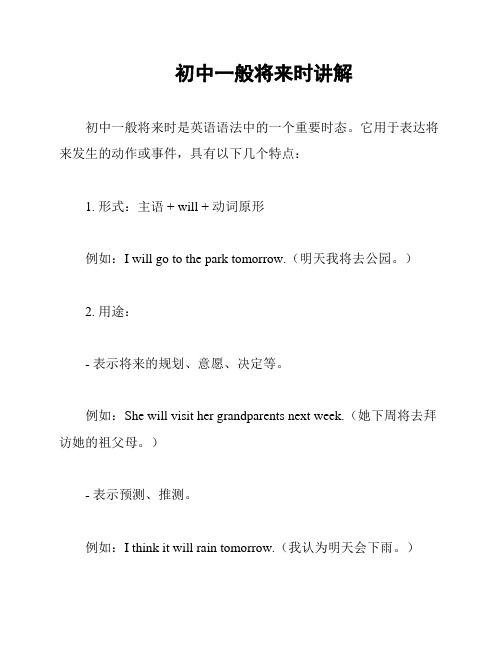
初中一般将来时讲解初中一般将来时是英语语法中的一个重要时态。
它用于表达将来发生的动作或事件,具有以下几个特点:1. 形式:主语 + will + 动词原形例如:I will go to the park tomorrow.(明天我将去公园。
)2. 用途:- 表示将来的规划、意愿、决定等。
例如:She will visit her grandparents next week.(她下周将去拜访她的祖父母。
)- 表示预测、推测。
例如:I think it will rain tomorrow.(我认为明天会下雨。
)- 用于官方通知、邀请、警告等场合。
例如:The school will hold a party next month.(学校下个月将举办一次聚会。
)- 用于做出决定或提供帮助。
例如:I will help you with your homework.(我将帮助你完成作业。
)3. 注意事项:- 表示将来的时间状语词一般使用,如tomorrow(明天)、next week(下周)等。
- 一般将来时常与表示将来的时间状语词或时间状语从句一起使用。
- 对于第一人称(I)和第二人称(you)的陈述句,可以使用缩略形式:I'll, you'll。
4. 示例:- She will go to the cinema this evening.- They will have a picnic in the park.- We will study Spanish next semester.- He will go on vacation next month.总之,初中一般将来时是英语语法中的重要时态,可以表达将来发生的动作或事件,同时也可以用于表示意愿、决定、预测等场合。
掌握这一时态的用法有助于学生加深对英语语法的理解。
(最新整理)初中英语一般将来时专项语法讲解
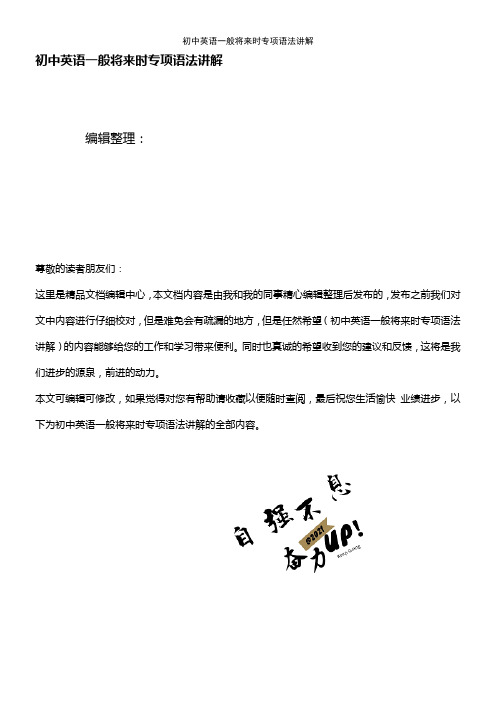
初中英语一般将来时专项语法讲解编辑整理:尊敬的读者朋友们:这里是精品文档编辑中心,本文档内容是由我和我的同事精心编辑整理后发布的,发布之前我们对文中内容进行仔细校对,但是难免会有疏漏的地方,但是任然希望(初中英语一般将来时专项语法讲解)的内容能够给您的工作和学习带来便利。
同时也真诚的希望收到您的建议和反馈,这将是我们进步的源泉,前进的动力。
本文可编辑可修改,如果觉得对您有帮助请收藏以便随时查阅,最后祝您生活愉快业绩进步,以下为初中英语一般将来时专项语法讲解的全部内容。
初中英语一般将来时专项语法讲解 一般将来时表示将来某个时间要发生的动作,事情或存在的状态,也表示将来经常或反复发生的动作或事情。
1)will/shall+动词原形 shall用于第一人称,常被will 所代替。
will 在陈述句中用于各人称,在征求意见时常用于第二人称。
will not=won't shall not=shan't例如: Which paragraph shall I read first?我先读哪一段呢? Will you be at home at seven this evening? 今晚七点回家好吗? 2) be going to +不定式,表示将来。
a. 主语的意图,即将做某事。
例如:What are you going to do tomorrow? 明天打算作什么呢? b。
计划,安排要发生的事.例如:The play is going to be produced next month。
这出戏下月开播。
c. 有迹象要发生的事。
例如:Look at the dark clouds, there is going to be a storm。
看那乌云,快要下雨了。
3) be +不定式表将来,按计划或正式安排将发生的事。
例如: We are to discuss the report next Saturday.我们下星期六讨论这份报告。
一般将来时知识点

一般将来时知识点一般将来时是英语中常用的一种时态,用来表示将来发生的动作或状态。
在句子中,一般将来时通常由助动词"will"或"shall"加动词原形构成。
除了表示将来的动作或状态外,一般将来时还可以表示决心、意图、预测、承诺以及请求等不同的语义。
下面是一些一般将来时的知识点:1.一般将来时的基本结构:主语 + will/shall + 动词原形+ …例如:- I will visit my grandparents tomorrow.(我明天会去看望我的祖父母。
)- He shall help you with the project.(他会帮助你完成这个项目。
)2.一般将来时的否定形式:主语 + will not/shall not + 动词原形+ …例如:- They will not arrive on time.(他们不会准时到达。
)- She shall not attend the meeting.(她不会参加会议。
)3.一般将来时的疑问形式:将助动词"will"或"shall"提前到句子的主语之前,并且将句末的问号加在句子结束处。
例如:- Will you come to the party?(你会来参加聚会吗?)- Shall we go for a walk?(我们去散步好吗?)4.一般将来时与时间状语的搭配:一般将来时经常和表示将来时间的状语词或短语一起使用,如:tomorrow(明天)、next week(下周)、in the future(在未来)等。
例如:- We will have a meeting tomorrow.(我们明天有个会议。
)- She shall complete the report next week.(她下周会完成这份报告。
)5.一般将来时表示打算、意图:一般将来时也经常用来表示打算、意图或计划要做某事。
【初中英语】初中英语一般将来时语法大全精讲
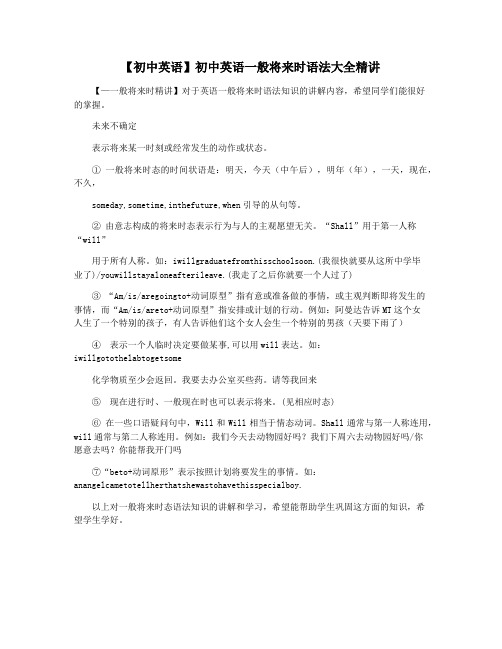
【初中英语】初中英语一般将来时语法大全精讲【—一般将来时精讲】对于英语一般将来时语法知识的讲解内容,希望同学们能很好的掌握。
未来不确定表示将来某一时刻或经常发生的动作或状态。
① 一般将来时态的时间状语是:明天,今天(中午后),明年(年),一天,现在,不久,someday,sometime,inthefuture,when引导的从句等。
② 由意志构成的将来时态表示行为与人的主观愿望无关。
“Shall”用于第一人称“will”用于所有人称。
如:iwillgraduatefromthisschoolsoon.(我很快就要从这所中学毕业了)/youwillstayaloneafterileave.(我走了之后你就要一个人过了)③ “Am/is/aregoingto+动词原型”指有意或准备做的事情,或主观判断即将发生的事情,而“Am/is/areto+动词原型”指安排或计划的行动。
例如:阿曼达告诉MT这个女人生了一个特别的孩子,有人告诉他们这个女人会生一个特别的男孩(天要下雨了)④表示一个人临时决定要做某事,可以用will表达。
如:iwillgotothelabtogetsome化学物质至少会返回。
我要去办公室买些药。
请等我回来⑤现在进行时、一般现在时也可以表示将来。
(见相应时态)⑥ 在一些口语疑问句中,Will和Will相当于情态动词。
Shall通常与第一人称连用,will通常与第二人称连用。
例如:我们今天去动物园好吗?我们下周六去动物园好吗/你愿意去吗?你能帮我开门吗⑦“beto+动词原形”表示按照计划将要发生的事情。
如:anangelcametotellherthatshewastohavethisspecialboy.以上对一般将来时态语法知识的讲解和学习,希望能帮助学生巩固这方面的知识,希望学生学好。
“一般将来时”的几种语法形式知识讲解

“一般将来时”的几种语法形式“一般将来时”的几种语法形式初中英语中表示一般将来时的语法形式有四种:shall/will+动词原形;be going to+动词原形;现在进行时和一般现在时。
现将这四种形式分述如下:一.shall/will+动词原形1.will可用于所有人称,但shall仅表示单纯将来时,用于第一人称I和we,作为will的一种替代形式。
以You and I为主语时通常避免用shall。
例如:He will be back soon.他很快就会回来。
I shall/will be free on Sunday.星期天我有空。
You and I will work in the same factory.你和我将在同一工厂工作。
2.will,shall可用来预言将来发生的事。
如说出我们设想会发生的事,或者请对方预言将要发生什么事。
例如:It will rain tomorrow.明天将要下雨。
3.will,shall除可表示单纯的将来时以外,还可以带有意愿的色彩,仍指的是将来。
例如:I’ll buy you a bicycle for your birthday.你过生日时,我给你买一辆自行车。
(表示允诺)Will you open the door for me please?请你帮我开门好吗?(表示请求)Shall I get your coat for you?我可以为你拿外套吗?(表示提议)二.be going to+动词原形1.表示说话人根据现在已有的迹象,判断将要或即将发生某种情况。
这类句子的主语可以是人,也可是物。
例如:There is going to be a football match in our school tomorrow afternoon.明天下午我们学校将有一场足球赛。
(已有告示)I feel terrible.I think I’m going to die.我感到难受极了,我想我快不行了。
初中英语语法一般将来进行时专项讲解及练习

初中英语语法一般将来进行时专项讲解及练习一、一般将来进行时的构成一般将来进行时是由“will be + 动词的ing形式”构成,表示将来某一时间正在进行的动作或事件。
具体构成如下:1. [肯定式]主语 + will be + 动词的ing形式例如:- I will be studying English at this time tomorrow.- They will be playing basketball next week.2. [否定式]主语 + will not be + 动词的ing形式(也可以使用缩写形式won't)例如:- She won't be sleeping when you arrive.- We will not be watching TV tonight.3. [疑问句]Will + 主语 + be + 动词的ing形式 + 其他?例如:- Will they be waiting for us at the station?- Will you be studying for the exam tomorrow?二、一般将来进行时的用法1. 表示将来某一时间正在进行的动作或事件,常常带有表示时间的状语。
例如:- She will be cooking dinner at 7 o'clock tomorrow.- They will be having a meeting this time next week.2. 表示对将来的推测或预测,常常带有表示将来的时间状语。
例如:- I think it will be raining tomorrow.- He will be studying hard for the exam next month.3. 与表示计划、安排的词语连用,表示预先安排好的将来动作。
例如:- We will be traveling to Paris next summer.三、一般将来进行时的练请根据句子的意思,用一般将来进行时进行填空。
一般将来时(8张PPT)初中英语专项复习课件

肯定句:主语+ will +do+其他 People will have robots in their homes. 否定句:主语+ will not /won't+do+其他 People will not/won’t have robots in their 一般疑问句:Will+主语+do+其他? 肯定回答:Yes, they will. 否定回答:No, they won’t. Will people have robots in their homes?
homes.
2.而be going to +do通常用来谈论在一个较近的未来将要发生的计 划中的或是有可能发生的事。如:
I am going to visit us next month.(在一个较近的未来将要发生 的计划中的事)
It is so cloudy. I think it’s going to rain. (有可能发生的事)
一般将来时
初中英语专项复习
一、一般将来时的意义: 用来描述一个即将要发生的动作;谈论未来的计划和打算。
二、一般将来时的基本结构: will/shall+动词原形
be going to+动词原形
常见时间状语:
next Tuesday next week the coming Sunday next year this afternoon
tomorrow tonight in a few minutes in the future in five years
三、一般将来时
1.will 用于一切人称,shall只用于第一人称(I/we)。但现代英语倾向 于所有人称都使用will而不用shall。will/shall + do通常用来谈论未 来会发生的事或是正在制定的计划。 It will rain this afternoon.(未来发生) I will take an umbrella with me.(计划)
完整)初中一般将来时讲解
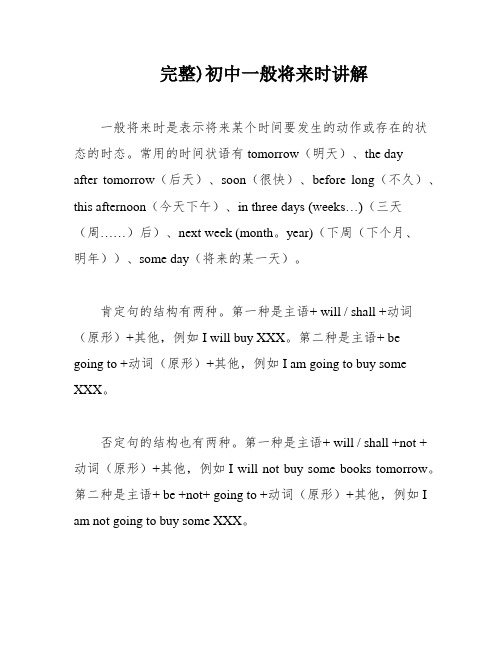
完整)初中一般将来时讲解一般将来时是表示将来某个时间要发生的动作或存在的状态的时态。
常用的时间状语有tomorrow(明天)、the dayafter tomorrow(后天)、soon(很快)、before long(不久)、this afternoon(今天下午)、in three days (weeks…)(三天(周……)后)、next week (month。
year)(下周(下个月、明年))、some day(将来的某一天)。
肯定句的结构有两种。
第一种是主语+ will / shall +动词(原形)+其他,例如I will buy XXX。
第二种是主语+ be going to +动词(原形)+其他,例如I am going to buy some XXX。
否定句的结构也有两种。
第一种是主语+ will / shall +not +动词(原形)+其他,例如I will not buy some books tomorrow。
第二种是主语+ be +not+ going to +动词(原形)+其他,例如I am not going to buy some XXX。
疑问句的结构也很简单。
第一种是Will / Shall +主语+动词原形+其他…?例如XXX?第二种是Be +主语+going to +动词原形+其他…?例如Are you going to buy some books tomorrow?肯定回答有两种方式。
第一种是Yes,主语+will,例如Yes。
I will。
第二种是Yes,主语+ be,例如Yes。
I am。
否定回答也有两种方式。
第一种是No,主语+will +not,例如No。
I will not。
第二种是No,主语+be + not,例如No。
I am not。
除了一般将来时,还有其他表示将来的时态,如be going to、be to(高中)、be about to(初中)。
初中英语一般将来时语法讲解
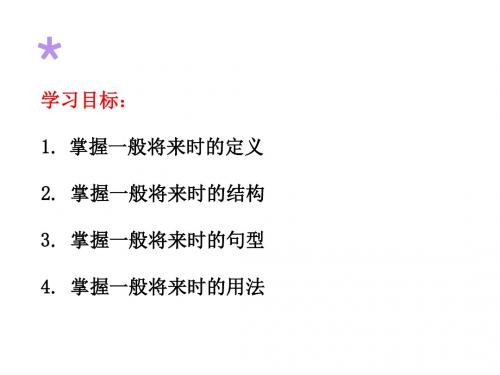
future
now
I will go back to my hometown next week. We will come to see you next Sunday.
2. 结构
(1)will +动词原形(主语是第一人称时也可用shall +动 词原形) (2)be(am, is, are) going to +动词原形
学习目标:
1. 掌握一般将来时的定义 2. 掌握一般将来时的结构
3. 掌握一般将来时的句型
4. 掌握一般将来时的用法
教学内容:
1. 一般将来时的定义 2. 一般将来时的结构
3. 一般将来时的句型
4. 一般将来时的用法
PART 01
定义和结构
1. 定义 表示将来某个时间要发生的动作或存在的状态,或 将来经常、反复发生的动作。
will/shall+动词原形 be going to +动词原形
表示较远的将来时间要发 生的事情 根据客观迹象表明马上要 发生的事情 没有“计划、准备”的意 思 表示近期就要发生的事情
表明说话者的主观意愿
含有“计划、准备”的意思
一、用词的适当形式填空。 1.He ____________(play )football after school . 2.It will be _____ (sun) tomorrow. 3.He __________ (be) a teacher in the future.
(4) “be +doing” 常与少量表示位置移动的动词,如go, come , start , move, leave等连用,用现在进行时表示 将来。 My aunt is leaving for Beijing next week.
初中英语一般将来时语法讲解

初中英语一般将来时语法讲解(名师剖析必考英语语法知识点,建议下载打印练习)一般将来时考点归纳【考点1】一般将来时的标志一般将来时常用时间状语例题:(2016重庆B卷)I _____ Chinese dishes for my foreign friends tomorrow evening.A. will cookB. have cookedC. cookD. cooked答案:A【考点2】一般将来时的结构1. will /shall +动词原形【注:在书面语中,主语是第一人称时,常用shall ,在口语中,所有人称都可以用will;且will 常简略为'll,如:I'll,he'll等】例题1:Her brother will watch a basketball game this evening.变否定句:_______________________________________________________变疑问句:_______________________________________________________肯定回答:___________________ 否定回答:_________________________例题2:I will perform ballet at the party tomorrow.变否定句:_______________________________________________________变疑问句:_______________________________________________________肯定回答:___________________ 否定回答:_________________________例题3:They will buy a new car next year ?(划线提问) _____ _____ they _____ next year?例题4:I will stay in China for two days ? (划线提问) _____ _____ _____you _____in China? 例题5:(2016广西玉林、防城港、崇左)---How long _____ you _____ Little Women ?---I am due to return it in two weeks.A. have; borrowedB. will; lendC. will; keepD. have; got答案:1. Her brother won’t watch a basketball game this evening.Will her brother watch a basketball game this evening?Yes, he will.No, he won’t.2. I won’t perform ballet at the party tomorrow.Will you perform ballet at the party tomorrow?Yes, I will.No, I won’t.3. What; will; buy4. How long will; stay5. C2.be going to +动词原形【注:be随着主语的变化有人称和数的变化】例题1:They are going to have a party this weekend.变否定句:_______________________________________________________变疑问句:_______________________________________________________肯定回答:___________________ 否定回答:_________________________划线提问:_______________________________________________________例题2:There (将有一场校运会) next month.例题3:(2016甘肃张掖)We ______ have a picnic together with our teachers next Thursday.A. are goingB. are going toC. will goingD. may going to答案:1. They aren’t going to have a party this weekend.Are they going to have a party this weekend?Yes, they are.No, they aren’t.2. is going to be a sports meeting3. B3. 现在进行时表将来例题:(2016辽宁沈阳)I think it is true that Jill _____ to work today because she is on a trip.A. has comeB. didn’t comeC. is comingD. will not come答案:C4. 一般现在时表将来例题1:(2016黑龙江齐齐哈尔)I wonder if she _____ me when _____.A. calls; she arrivesB. will call; she arrivesC. calls; she will arrive例题2:(2016湖北咸宁)---I don’t know if it _________tomorrow.---Well, if it __________, the school sports meet will be canceled.A. will rain; will rainB. rains; will rainC. will rain; rainsD. rains; rains 例题3:(2016湖南邵阳)We _____ for a picnic if it _____rain this Sunday.A. will go; doesn’tB. will go; won’t goC. go; doesn’t答案:BCA5. 其他表将来的结构【了解即可】【考点3】will和be going to 的异同点例题1:(2016山东临沂)---Did you call Jenny ?---Oh no, I forget. I ______her right away.A. calledB. have calledC. callD. will call例题2:(2016福建泉州)---Have you watched the movie Kung Fu Panda 3, Kelly ?---Not yet. I ______it with my classmates tonight.A. will watchB. was watchingC. have watched例题3:(2016贵州六盘水)There ______ a football game in our city next week.A. will haveB. will beC. is going to haveD. is going to be答案:DAD【考点4】一般将来时的易错点例题1:(2016河北)Just go down the road, and you _______ the library next to the bank.A. seeB. sawC. have seenD. will see例题2:(2016广西玉林、防城港、崇左)---Do you know ______ a wonderful football match and two basketball matcheson July 15th?---Yeah. I am going to watch them on that day.A. there will beB. there will haveC. there areD. there have例题3:(2016甘肃武威)We ______ have a picnic together with our teachers next Thursday.A. are goingB. are going toC. will goingD. may going to答案:DAB基础演练教学建议:建议此部分用作当堂检测练习,复习完一般将来时时的相关考点以后,即刻让学生完成一般将来时的综合练习。
(完整版)一般将来时时态用法讲解
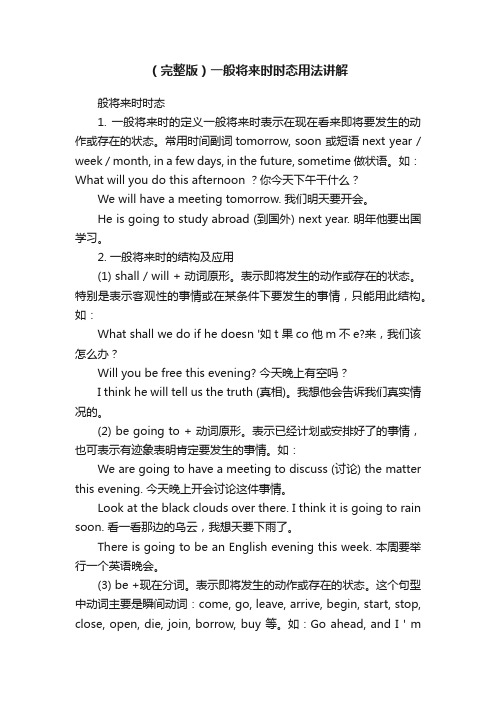
(完整版)一般将来时时态用法讲解般将来时时态1. 一般将来时的定义一般将来时表示在现在看来即将要发生的动作或存在的状态。
常用时间副词tomorrow, soon 或短语next year / week / month, in a few days, in the future, sometime 做状语。
如:What will you do this afternoon ?你今天下午干什么?We will have a meeting tomorrow. 我们明天要开会。
He is going to study abroad (到国外) next year. 明年他要出国学习。
2. 一般将来时的结构及应用(1) shall / will + 动词原形。
表示即将发生的动作或存在的状态。
特别是表示客观性的事情或在某条件下要发生的事情,只能用此结构。
如:What shall we do if he doesn '如t 果co他m不e?来,我们该怎么办?Will you be free this evening? 今天晚上有空吗?I think he will tell us the truth (真相)。
我想他会告诉我们真实情况的。
(2) be going to + 动词原形。
表示已经计划或安排好了的事情,也可表示有迹象表明肯定要发生的事情。
如:We are going to have a meeting to discuss (讨论) the matter this evening. 今天晚上开会讨论这件事情。
Look at the black clouds over there. I think it is going to rain soon. 看一看那边的乌云,我想天要下雨了。
There is going to be an English evening this week. 本周要举行一个英语晚会。
初中英语语法——一般将来时详细讲解
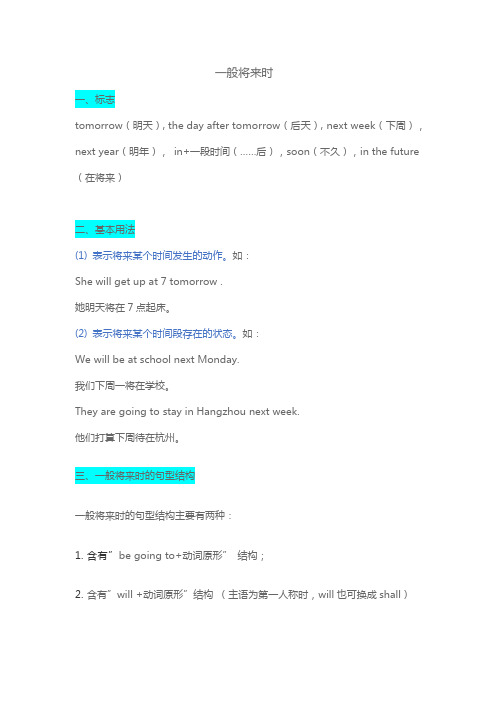
一般将来时一、标志tomorrow(明天), the day after tomorrow(后天), next week(下周),next year(明年),in+一段时间(……后),soon(不久),in the future (在将来)二、基本用法(1) 表示将来某个时间发生的动作。
如:She will get up at 7 tomorrow .她明天将在7点起床。
(2) 表示将来某个时间段存在的状态。
如:We will be at school next Monday.我们下周一将在学校。
They are going to stay in Hangzhou next week.他们打算下周待在杭州。
三、一般将来时的句型结构一般将来时的句型结构主要有两种:1.含有”be going to+动词原形”结构;2.含有”will +动词原形”结构(主语为第一人称时,will也可换成shall)(1)肯定句:She is going to buy some vegetables tomorrow morning . 她打算明天上午买一些蔬菜。
(2)否定句:在be动词后加not。
is和are可以和not缩写为isn't,aren't。
She isn’t going to buy any vegetables tomorrow morning . 她明天上午不去买蔬菜。
(3)一般疑问句及其答语:将be动词放在句子开头,且首字母要大写,句末用问号。
肯定回答:Yes,主语的相应代词+am/is/are.否定回答:No,主语的相应代词+am not /isn't/aren't.—Is she going to buy any vegetables tomorrow morning?她打算明天上午去买一些蔬菜吗?—Yes,she is./No,she isn't. 是的,她打算去。
初中英语一般将来时专项语法讲解(总13页)

初中英语一般将来时专项语法讲解-CAL-FENGHAI.-(YICAI)-Company One1-CAL-本页仅作为文档封面,使用请直接删除一般将来时主要构成形式一般将来时表示将来某个时间要发生的动作,事情或存在的状态,也表示将来经常或反复发生的动作或事情。
1)will/shall+动词原形 shall用于第一人称,常被will 所代替。
will 在陈述句中用于各人称,在征求意见时常用于第二人称。
will n ot=won't shall not=shan't例如:Which paragraph shall I read first 我先读哪一段呢Will you be at home at seven this evening 今晚七点回家好吗2) be going to +不定式,表示将来。
a. 主语的意图,即将做某事。
例如:What are you going to do tom orrow 明天打算作什么呢b. 计划,安排要发生的事。
例如:The play is going to be produc ed next month。
这出戏下月开播。
c. 有迹象要发生的事。
例如:Look at the dark clouds, there is going to be a storm. 看那乌云,快要下雨了。
3) be +不定式表将来,按计划或正式安排将发生的事。
例如:We are to discuss the report next Saturday.我们下星期六讨论这份报告。
4) be about to +不定式,意为马上做某事。
例如:He is about to leave for Beijing. 他马上要去北京。
注意:be about to do 不能与tomorrow, next week 等表示明确将来时的时间状语连用。
Notice:be to和be going tobe to 表示客观安排或受人指示而做某事,be going to 表示主观的打算或计划。
初中英语一般将来时专项语法讲解
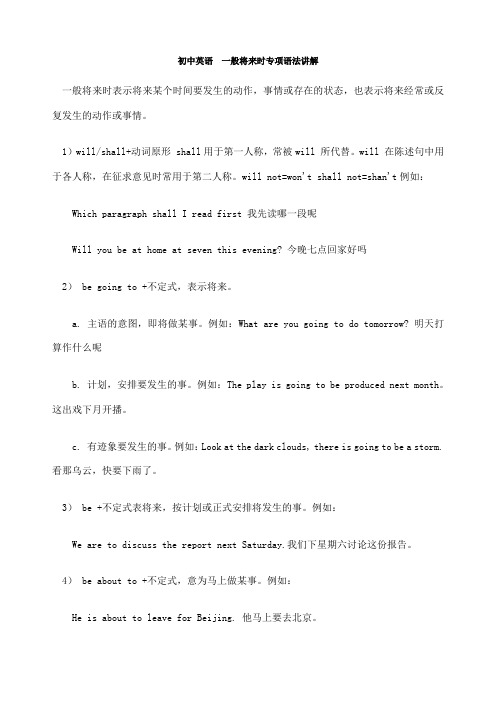
初中英语一般将来时专项语法讲解一般将来时表示将来某个时间要发生的动作,事情或存在的状态,也表示将来经常或反复发生的动作或事情。
1)will/shall+动词原形 shall用于第一人称,常被will 所代替。
will 在陈述句中用于各人称,在征求意见时常用于第二人称。
will not=won't shall not=shan't例如:Which paragraph shall I read first 我先读哪一段呢Will you be at home at seven this evening? 今晚七点回家好吗2) be going to +不定式,表示将来。
a. 主语的意图,即将做某事。
例如:What are you going to do tomorrow? 明天打算作什么呢b. 计划,安排要发生的事。
例如:The play is going to be produced next month。
这出戏下月开播。
c. 有迹象要发生的事。
例如:Look at the dark clouds, there is going to be a storm. 看那乌云,快要下雨了。
3) be +不定式表将来,按计划或正式安排将发生的事。
例如:We are to discuss the report next Saturday.我们下星期六讨论这份报告。
4) be about to +不定式,意为马上做某事。
例如:He is about to leave for Beijing. 他马上要去北京。
注意:be about to do 不能与tomorrow, next week 等表示明确将来时的时间状语连用。
Notice:be to和be going tobe to 表示客观安排或受人指示而做某事,be going to 表示主观的打算或计划。
例如:I am to play football tomorrow afternoon. 明天下午我去踢球。
(完整版)初中一般将来时讲解.docx
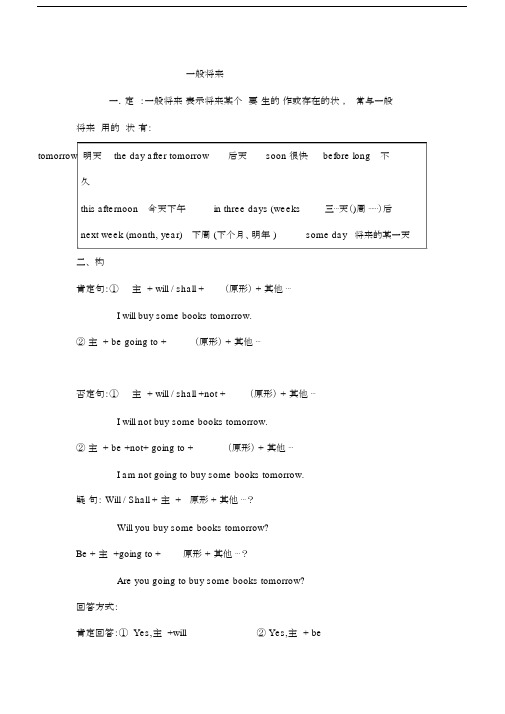
一般将来一.定:一般将来表示将来某个要生的作或存在的状,常与一般将来用的状有:tomorrow 明天the day after tomorrow后天soon 很快before long不久this afternoon今天下午in three days (weeks三⋯天()周⋯⋯)后next week (month, year)下周(下个月、明年)some day将来的某一天二、构肯定句:①主+ will / shall +(原形)+其他⋯I will buy some books tomorrow.②主 + be going to +(原形)+其他⋯否定句:①主+ will / shall +not +(原形)+其他⋯I will not buy some books tomorrow.②主 + be +not+ going to +(原形)+其他⋯I am not going to buy some books tomorrow.疑句: Will / Shall + 主 + 原形 + 其他⋯?Will you buy some books tomorrow?Be + 主 +going to +原形+其他⋯?Are you going to buy some books tomorrow?回答方式:肯定回答:① Yes,主 +will② Yes,主+ be否定回答:① No, 主 +will +not② No,主+be + not特殊疑句:特殊疑+shall /will+主+原型+其他⋯Where will you go next week?下星期你去哪?What shall I do? 我怎么呢 ?How many books will they get?他将有多少本?三区.will, be going to⋯, be to(高⋯中), be about to(初中)⋯1.be going to + 不定式,表示将来。
